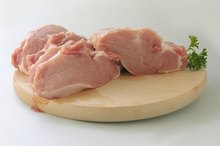What does fact checked mean?
At Healthfully, we strive to deliver objective content that is accurate and up-to-date. Our team periodically reviews articles in order to ensure content quality. The sources cited below consist of evidence from peer-reviewed journals, prominent medical organizations, academic associations, and government data.
- National Digestive Diseases Information Clearinghouse: Lactose Intolerance
- Cleveland Clinic: Lactose Intolerance
The information contained on this site is for informational purposes only, and should not be used as a substitute for the advice of a professional health care provider. Please check with the appropriate physician regarding health questions and concerns. Although we strive to deliver accurate and up-to-date information, no guarantee to that effect is made.
Does Cheese Cause Bloating?
Eating cheese may cause an upset stomach, poor digestion, gas or, in some cases, bloating. Cheese contains lactose, a natural sugar found in milk products, which can be difficult for some people to digest, which can cause bloating. Bloating can also occur after eating cheese if you have irritable bowel syndrome. While bloating is not a symptom, eating cheese may also affect those with a milk allergy.
If you are experiencing serious medical symptoms, seek emergency treatment immediately.
Lactose Intolerance
Lactose intolerance results when the body produces insufficient lactase, an enzyme, to digest lactose, or when the body has a problem absorbing lactose 3. In both cases, this leads to undigested lactose, which can cause:
- pains
- diarrhea
- gas
- bloating
A physical exam by a doctor, testing for abdominal bloating as well as tenderness and pain, is required to diagnose lactose intolerance 3. If you are lactose intolerant, consider eating non-dairy cheese substitutes or eating only hard cheeses, such as Parmesan, cheddar or Swiss, as they contain little lactose.
Irritable Bowel Syndrome
Cheese Allergy Symptoms
Learn More
High fat foods such as cheese can exacerbate IBS symptoms. While IBS can result from an illness, it is also often a chronic condition, so regularly avoiding high fat cheeses is important to avoid symptoms. If you must include cheese in your diet, look for low-fat alternatives, preferably ones that have been fermented or cultured, such as yogurt cheeses or cottage cheese. Cultured cheeses irritate your bowel less and the lower fat content is less likely to trigger IBS symptoms like bloating.
- High fat foods such as cheese can exacerbate IBS symptoms.
- Cultured cheeses irritate your bowel less and the lower fat content is less likely to trigger IBS symptoms like bloating.
Milk Allergy
Milk allergies, particularly to cow’s milk, is more common in infants and small children, although it can also affect adults. Symptoms of an allergy can be mild to severe, manifesting as hives, or in extreme cases, anaphylactic shock. A blood test is needed to diagnose the condition, and while most children outgrow a milk allergy, in some cases it persists into adulthood. Unlike with lactose intolerance, a milk allergy is caused by the immune system’s overreaction to milk, rather than an inability to digest a natural sugar 3. Bloating is not typically a symptom of a milk allergy. If you believe you have a milk allergy, get an allergy test and avoid cheese and other milk products until the diagnosis is confirmed.
- Milk allergies, particularly to cow’s milk, is more common in infants and small children, although it can also affect adults.
Other Potential Causes
Cheese Allergy Symptoms
Learn More
While cheese can be difficult for many people to digest, look for other causes of bloating in your diet other than just cheese. In some cases, other food intolerances or IBS triggers can cause bloating as well, so cheese may not be the primary culprit. To be sure, eliminate cheese from your regular diet to see if the situation improves. If it does not, check that you have no other food intolerances and that your diet is high in dietary fiber. A diet high in dietary fiber can reduce the symptoms of IBS and slow down the passage of food through your digestive system, giving your body more time to break down foods for better absorption.
- While cheese can be difficult for many people to digest, look for other causes of bloating in your diet other than just cheese.
Related Articles
References
- International Foundation for Functional Gastrointestinal Disorders: About Irritable Bowel Syndrome (IBS)
- Food Allergy Research and Education: Milk Allergy
- Cleveland Clinic: Lactose Intolerance
- US National Library of Medicine. Lactose intolerance. Medline Plus. 2019.
- National Institutes of Health. Lactose Intolerance. Genetics Home Reference. 2019.
- Borghini R, Donato G, Alvaro D, Picarelli A. New insights in IBS-like disorders: Pandora's box has been opened; a review. Gastroenterol Hepatol Bed Bench. 2017;10(2):79-89.
- Szilagyi A, Ishayek N. Lactose intolerance, dairy avoidance, and treatment options. Nutrients. 2018;10(12). doi:10.3390/nu10121994
- Johns Hopkins Medicine. Lactose intolerance.
- KidsHealth from Nemours. Lactose intolerance. 2015.
- UW Integrative Health. The elimination diet. School of Medicine and Public Health University of Wisconsin Madison.
- Dekker PJT, Koenders D, Bruins MJ. Lactose-free dairy products: Market developments, production, nutrition and health benefits. Nutrients. 2019;11(3). doi:10.3390/nu11030551
- Cleveland Clinic. Gas: management and treatment. 2016.
- Ferreira-lazarte A, Moreno FJ, Villamiel M. Application of a commercial digestive supplement formulated with enzymes and probiotics in lactase non-persistence management. Food Funct. 2018;9(9):4642-4650. doi:10.1039/c8fo01091a
- Ferreira-Lazarte A , Moreno FJ , Villamiel M .Application of a commercial digestive supplement formulated with enzymes and probiotics in lactase non-persistence management.Food Funct. 2018 Sep 19;9(9):4642-4650. doi: 10.1039/c8fo01091a.
- Varjú P, Gede N, Szakács Z, Hegyi P, Cazacu IM, Pécsi D et al. Lactose intolerance but not lactose maldigestion is more frequent in patients with irritable bowel syndrome than in healthy controls: A meta-analysis.Neurogastroenterol Motil. 2019 May;31(5):e13527. doi: 10.1111/nmo.13527. Epub 2018 Dec 17.
Writer Bio
Jessica Hendricks has worked as a professional journalist for CBS and ABC News in the areas of health, fitness and nutrition. Passionate about wine, she has also worked for several food and drink publications. She holds three master's degrees in Eastern European culture, journalism and nutrition and dietetics.








